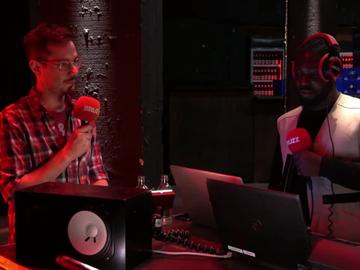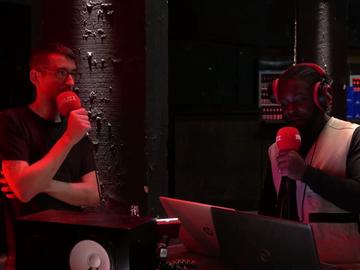After 567 days, the clubs can finally reopen their doors. DJ's will broadcast their hottest floorfillers on the dancefloor while you dance your way to the top. But is the nightlife scene just picking up where it left off, or has the break led to new insights? “I think the energy is even greater than before.”
© Ivan Put
| Lorenzo Serra van de Brussels By Night Federation en Sara Dziri van Not Your Techno kijken uit naar de heropening van het nachtleven
Also read: Parlement stemt over betere bescherming nachtclubs: 'Anders dreigt een levenloos Brussel'
Who is Sara Dziri?
- Born in Antwerp, moves to Brussels ten years ago
- Falls in love with electronic music after a Catclub-party and starts DJing herself in 2014
- Releases her debut EP in 2019, Glimpse of an Eye
- Founds Not Your Techno, a collective that promotes diversity in the electronic music scene
- Creates music for Sidi Larbi Cherkaoui’s dance performance for Walk with Amal
- Becomes resident-DJ at Fuse
Who is Lorenzo Serra?
- Born in 1968 in Brussels
- Organises the famous Dirty Dancing parties at the Mirano and is the man behind the Libertine Supersport nights at K-NAL
- Becomes one of the driving forces of the Listen! festival, the highlight of electronic music in Brussels
- Co-founds the Brussels By Night Federation in 2020
"I must admit I’m a bit tired,” grins Lorenzo Serra of the Brussels By Night Federation, founded last year to represent the interests of Brussels nightlife. “The past few months have been tough. Not only was there the lobbying work with Brussels By Night to steer the sector through the crisis in the best possible way, but also organising the Club Open Airs and the guinguette at See U consumed a lot of energy.”
On top of that, there is October 1 yet to come, no less than a big bang of nightlife, after eighteen months of darkness for the wrong reasons. A period in which DJs barely kept their heads above water, clubs were trying to stave off bankruptcy and club-goers were having a hard time keeping their twisting bodies under control.
But now there is a light at the end of the tunnel. Finally. Other than the Covid Safe Ticket and extra logistic facilities like ventilation, night owls will be able to party like before in clubs like Fuse, Bloody Louis and C12, or dance bars like Bar du Marché and Jalousy. Or? “The pause button has been held down for a very long time, but without losing any of the energy,” says Sara Dziri, founder of the collective Not Your Techno and resident DJ at Fuse from October onwards. “I think the energy is even greater than before.”
Are you looking forward to October 1?
Lorenzo Serra: With great gusto. But I’m also going to be happy that my schedule will look just a little less crazy. From then on, Brussels By Night will shift its focus to the longer term, and will finally be able to deal with subjects that require more time. Until now, it was mainly a matter of following up the measures at the last minute, lobbying and changing gear very quickly.
Sara Dziri: Everything can change at the last minute, which is hell. I also work in theatre and dance. There too, agendas and schedules were constantly being swapped around. But of course it’s really cool that we can go back to dancing again now. I’m looking forward to it.
Serra: Normally you start preparing an event a two to eight months in advance, at least. But the final decision that we can open, and on what conditions, was only taken ten days ago. Although there are still many things we do not know. What ventilation systems are needed. Where should we install CO2 meters? Are the opening hours unlimited? The time frame in which our industry has to work is completely insane. But what options are there? You have to jump, or you’re out.
Can you understand that nightlife had to wait the longest to reopen?
Serra: The answer is not simple. Scientifically speaking, getting together with many people in a small space was totally irresponsible, and partying with a mouth mask and physical distance is just impossible. So, yes, it makes sense that we had to wait a long time. But at the same time it hurt to see nightlife, and the cultural sector in general, considered less important. At least half of the nightlife industry has experienced a collective depression. It was very clear to us that we did not count.
People are not robots. They have feelings and desires, and they want to express them
Belgium has always been renowned for its electronic music scene and its nightlife. But when it came down to it, that didn’t seem to count.
Serra: In the perception, culture was that subsidized thing, where people would manage. But 80 to 90 percent do not get a penny of government money allocated. Moreover, the importance of culture and nightlife, in particular to the mental health of a society, was overlooked. The fact that this was not a priority will be with us for years to come. I fear for the mental health of many people. I’ve seen adolescents start dealing. There are people who have taken their own life. We focused too much on the physical impact of the virus, and not on the mental aftermath.
Dziri: I sensed a lot of fear in our society in general. Because of that, the priorities for politicians were not the long-term well-being of the population. Instead, all the energy was focused on keeping hospital admissions under control, which is obviously very important. It is just sad to see that no account was taken of all the other suffering it caused. Often, the choices made were driven by fear, and not by numbers, lessons learned and common sense.
Serra: Totally. At the beginning of the summer last year, the infections had dropped to almost zero, there were no more Covid deaths. And yet, we were not allowed to organise anything. Even in Spain, which was so badly affected, things could start up again. During the day, because you don’t necessarily have to party at night. I remember a concert given by two sisters, a harpist and a cellist, at the Delhaize in Schaerbeek, as a protest against the closure of the concert halls: they were allowed to play music in the supermarket, but not in a designated area.
Dziri: I found it distressing that there is so much prejudice against artists. The grants paid were very small, with no real recognition of the work that artists do. It was assumed, somewhat by definition, that as an artist you were poor anyway and so a small grant should suffice. The crisis made it clear how badly we need a real artist status, because so many artists fell through the cracks of our social safety net. A safety net that turned out to be there for others.
France and Germany showed that things could be done differently. There, the authorities did come up with sufficient support for nightlife.
Dziri: I think it has to do with a generation gap, and a disregard for youth. Most politicians are a bit older. Going out is not necessarily part of their lives anymore. They don’t need it. So they think: we can do without for a while.
Serra: I was shocked when Sophie Wilmès condemned the partying youths at Flagey. I’m not super-young anymore, I’m a father, but I haven’t forgotten who I was when I was eighteen. Okay, she was prime minister at the time, but she shouldn’t pretend to be our mother and treat us like we’re children. People are not robots. They have feelings and desires, and they want to express them. Making the gap between old and young even greater was precisely the trap we had to be careful not to fall into. Young people were showing solidarity, they wanted to protect their parents and grandparents. And she destroyed all of that in one second.
This stigmatisation reminded me of the 1980s, when AIDS was rampant. At the time, it was common to say that AIDS was the result of immoral behaviour. I can’t stand people lecturing others. Apparently it’s more normal to work in a factory than in the nightlife sector. People understand that. That’s the economy. Culture, that’s entertainment, pastime.
Dziri: The impact of our sector on the economy and the image of a city is greatly underestimated. Despite the issues surrounding drugs and safety, we are still the most popular leisure activity for many young people. Let us work on these issues instead of continuing to sweep them under the carpet. It was very clear during the lockdown how much young people will continue to come together, how much there is a need for an outlet. Do not take this lightly, attach importance to it. Give more confidence to the sector.
The impact of our sector on the economy and the image of a city is greatly underestimated. Despite the issues surrounding drugs and safety, we are still the most popular leisure activity for many young people
How much damage did Covid really do?
Serra: It’s hard to say. The city has barely any figures on Brussels nightlife, how many people work there, how much money is involved. With Brussels By Night, we were primarily concerned with the clubs, party collectives and festival organisers, and less with the individual artists. Venues have enormous fixed costs, ranging from 8,000 to 45,000 euros per month. If you do that times 18, well, do you need to know more? We wanted first and foremost to ensure that those clubs would continue to exist. Otherwise, you risk having a restart with no places for the DJs and partygoers to go.
As for the damage, three clubs are gone, three have a court settlement. Some clubs have been able to delay payments. But it’s going to come down to pulling in crowds now. Because if you don’t, there will be a real bloodbath.
Dziri: Just before the pandemic broke out, I had decided to go professional for music. (Laughs) Actually, I was lucky to be a full-time artist because it allowed me to take advantage of the bridging rules. Others, who occasionally worked in the sector and actually had no status, and beyond that lived off crumbs in the catering industry, had nothing at all. Apart from that, I wanted to release music, and like so many others, I delayed that to next year.
Serra: Outsiders often do not realise how difficult that is. Artists who were on the verge of a breakthrough see that fail because they now find no place on overcrowded posters. Culte Agency, for example, which books and manages artists from the electronic music scene, was going to explode in 2020. But suddenly, years of work were thrown into the dustbin.
Are the dance enthusiasts really as hungry as we think, or do you still detect hesitation?
Serra: Are you crazy? The urge to dance is immense! (Laughs) The Club Open Airs have proven that over the past few months. People partied there like nobody’s business, without the slightest incident. It had been a long time since I had seen that. That was really heartwarming.
Will the Covid Safe Ticket be a hurdle?
Serra: I don’t think it makes sense to impose something like this in a democracy, but we need to be able to live together and this is the only way. At the Club Open Airs, things went very smoothly. There were no rioters who wanted in without a Covid Safe Ticket. The dance floor is no place to protest, if you want to resist the system you have to take to the streets with a placard.
_Ivan_Put.jpg?style=W3sicmVzaXplIjp7ImZpdCI6Imluc2lkZSIsIndpZHRoIjozNTAsImhlaWdodCI6bnVsbCwid2l0aG91dEVubGFyZ2VtZW50Ijp0cnVlfX0seyJqcGVnIjp7InF1YWxpdHkiOjk1fX1d&sign=0f945a7440f2bc4fb31f53b25e6150e067091865914dc603976e3d104a7f1515)
© Ivan Put
Has the nightlife scene also been able to take something positive from this crisis?
Serra: The biggest “advantage” for me is the creation of the Brussels By Night Federation. We finally have a voice, a spokesperson. At last, we can be heard. We have organised workshops, protocols were written for the reopening. With people from the techno world as well as the hip-hop scene, Latin lovers, the queer scene, both subsidised and unsubsidised culture and so on. New contacts have been made, people who didn’t know each other now know that they exist. And we are recognised by the authorities, who realise that the world of the night is part of the Brussels ecosystem. That’s huge.
Secondly, there is what I call the boomerang of creativity: young people want to express themselves, and you can’t stop that simply by pressing pause. That boomerang is now going to come back hard, in the positive sense. There was a lot of talk about Brussels before the corona crisis, the scene was real, it was buzzing, but after this debacle it will be even more so. For example, I see a new club, Rust, founded by a couple of young guys. That says a lot.
With Not Your Techno, you’re pushing for more inclusiveness, Sara. That says there was a need.
Dziri: Yes, there are still many needs to fulfil. Even though diversity is a hot topic right now and I notice that a lot of people in the scene are doing things around it, I still think that there is a long way to go, and I especially hope that this is not a temporary trend. With Not Your Techno, we organised talks during the lockdown about things that we think could be done better in the electronic music scene. The VRT showed a documentary about Belgian electronic music where almost no woman was mentioned, which led us to hold a talk about the under-representation of women. Our second talk was about the participation of the Maghreb community in electronic music. Apart from myself – I’m half Tunisian – and a few others, I see hardly anyone from this background in our scene. We also talked about tips and tricks for beginning artists to feel more empowered in our scene which is predominantly cis, white and male.
Serra: For me, nightlife is the “shaker” of democracy. La nuit, tous les chats sont gris, they say. That’s true, but all walks of life do come together while partying, all colours, orientations and social classes. Not always and everywhere, but it can be done. We used to pay attention to that too, but we didn’t say it openly. I thought it was a given that LHBTIQ+ people came to my parties. But now it’s being said out loud, and actually that’s pretty cool.
The night is a kind of magnifying mirror of our society: everything happens there in superlatives. The shortcomings, the excesses, are much more visible there. On the one hand we are the jesters who have to entertain the king, on the other hand we do have to ensure safety, control drugs and alcohol, curb transgressive behaviour, provide employment.... That is quite a responsibility and we are working hard on it. But we can do it. Look at those clandestine parties: there have been deaths. That doesn’t happen in our clubs. We must stress that we are part of the solution, not the problem.
Read more about: Muziek , clubs , brussels by night federation , Not Your Techno , Lorenzo Serra , Sara Dziri , heropening nachtleven



